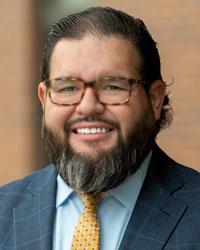Luis Olivas

Degrees and Credentials
M.A. in Journalism and Mass Communications, University of Nebraska – Lincoln
Grad. Cert. in Public Relations & Social Media, University of Nebraska – Lincoln
B.A.E. in History and Ethnic Studies, University of Nebraska at Kearney
A.A. in Academic Transfer, Central Community College – Nebraska
Short Bio
Luis Olivas is the inaugural Associate Dean of Students for Inclusion & Belonging at Pitt-Bradford since his appointment in July 2024.
He brings a wealth of experience and expertise to his new role as Associate Dean of Students for Inclusion & Belonging at the University of Pittsburgh at Bradford. Serving at the University of Nebraska at Kearney since 2018, most recently as Director of Intercultural Engagement & Leadership, Luis has developed a deep understanding of the importance of creating inclusive environments that foster a sense of belonging for all students. His background in Gender & Sexuality, Multicultural Affairs, Title IX, Student Conduct, and Inclusive Excellence has equipped him with the skills to address complex issues and promote cultural responsiveness across higher education institutions.
Luis is dedicated to ensuring that all members of the Pitt-Bradford community feel valued, respected, and supported in their academic and personal pursuits. Luis has been a contributor for BuzzFeed News, Univision, Telemundo, and NPR. He and his spouse Ashley live in Bradford, PA.
Research, Accomplishments, and Publications
Luis’s research focuses on examining the intersections of family dynamics, socio-economic status, and educational outcomes for first-generation college students from underserved and underrepresented communities. Specifically, how familial support systems, including parental education level, socio-economic status, and cultural capital, influence the academic experiences and outcomes of these students. Ultimately, the goal is to develop evidence-based interventions to promote inclusive and equitable higher education environments for underserved and underrepresented communities.